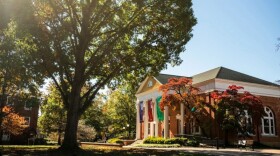North Carolina's photo ID law for voting was enacted in 2018, but this year will be the first time many voters in the state will be navigating the requirement.
That's because the law had been blocked from taking effect. A state court that found, based on expert testimony for voting and civil rights advocates challenging it, the requirement would disparately affect Black voters less likely to have the requisite forms of ID.
At a 2021 trial over the ID law, University of Michigan Professor Kevin Quinn, a paid expert in political methodology and applied statistics, testified that he found that African American voters were 39% more likely than white voters to lack qualifying ID. His finding was based on North Carolina voter files cross matched with DMV records and databases from state universities and government agencies.
The state Supreme Court affirmed the lower court finding that the ID was discriminatory when Democrats on the bench held a majority. But GOP victories in the 2022 primaries gave Republicans a majority on the court. The new court then lifted the injunction and reinstated the ID requirement in time for last year's municipal elections.
List of accepted IDs is long

A couple of weeks ago, O'Dell Justin Hill, a 21-year-old college student from Durham, stood before a small, computer-mounted camera at the Board of Elections in his home county.
"So, what I'm going to do is have you look straight ahead into the light, I'll count to the three and take the picture," the elections official told Hill. And minutes after his arrival at the Durham elections office Hill had his free photo ID.
"With that voter ID you have proof itself to say you can vote," Hill told WUNC, showing off his newly minted photo ID with a confident, buoyant air.
It is proof Hill can vote, but not the only proof. At least in Hill's case, it's not even necessary because he already had a valid state driver's license.
That is something Durham County Elections Director Derek Bowens said he has seen before: a misguided belief among voters that they must get a board-issued ID.
"You know, I had one gentleman come in and say, 'Yeah, I've got all these IDs, are these acceptable?'" Bowens recounted recently. "And I said, 'Yes sir, you've got plenty that are acceptable.' 'Well, I want to get the free one you have too because I don't want any problems when I get to the polling place.'"
This exchange happened in last year's municipal elections when the ID law took effect, requiring photo IDs for casting in-person and absentee ballots.
The thing that seems to be lost on many voters, according to Bowens and other local elections directors I interviewed, is the wide variety of photo IDs that are accepted.
"We've explained to the senior citizens if you had an ID at the age of 65 that was unexpired when you were 65, but is now expired, you can use that ID," said Jane Rae Fawcett, Lee County's elections director.
Like other directors across the state, Fawcett said she has tried to get the word out about the voter ID rules, issuing IDs at the local senior center and community events.
Under certain exceptions, voting without photo ID is allowed

The list of acceptable forms of photo ID includes U.S. passports, college student IDs approved by the State Board of Elections, tribal enrollment cards, public school employee IDs approved by the state elections board, and photo ID cards issued by federal and state public assistance programs.
"It's a pretty extensive list," said Olivia McCall, Wake County's elections director. "But the big thing is if someone wants a photo ID from our office, we're going to be accommodating for that."
McCall said she hasn't seen a flood of voters seeking the free IDs but notes the law just went into effect before last year's municipal elections, contests limited to certain towns and cities and a relatively small pool of voters.
"In 2024, this is the first time we're having a full-blown, 212 precincts open, and I'm sure we're going to see a higher turnout of people wanting to get a photo ID to be prepared," McCall predicted.
As State Board of Elections Executive Director Karen Brinson Bell noted, registered voters who lack proper ID can still cast a provisional ballot under certain exceptions.
"Religious reasons or maybe you didn't have proper transportation to go get an ID or we could be faced with a natural disaster that could impact some folks," Brinson Bell explained.
That provisional ballot will be counted unless a local elections board unanimously finds the voter's exception form to be false.
And if a person shows up at an early voting site or on Election Day without proper ID and doesn't fall into one of the exception categories, they, too, can cast a provisional ballot. But they would have to return to their local elections office prior to the county canvass and present a valid ID.
Poll workers checking for a 'reasonable resemblance'
"Well, I'll tell you, it's a lot of material they're covering in these training classes," said Jan Drabik, a volunteer poll worker I recently spoke with at the Wake County Board of Elections. "It's going to be a challenge to keep it all straight."
Volunteers like Drabik will be checking in voters and looking for a reasonable resemblance between the voter and the photo on their ID, taking into account changes in appearance over time.
Any challenges to the resemblance would need to be reviewed by a polling place's bipartisan group of precinct judges and can only be upheld unanimously. Even then, a voter with a challenged ID could cast a provisional ballot.
Scenarios like that concern voting rights advocates such as Ann Webb, policy director at Common Cause North Carolina. They worry, for example, that voters who cast a provisional ballot and to have it counted must return to their elections board to present a valid photo ID might be dissuaded or unable to do so.
Webb told WUNC that one of her organization's biggest concerns is voters deciding not to cast a ballot because of uncertainty about the ID requirement and being unsure about how to navigate the rules.
"We really, really encourage folks, you know, bring your wallet, bring everything you've got, put it on the table, find the ID that will allow you to cast a ballot, whether it's during early voting or on Election Day," Webb said.
Inconsistencies in the way various local boards across the state enforced the photo ID requirement for last fall's municipal elections have raised concerns in the civil and voting rights advocacy community.
"In some cases, voters’ ID Exception Forms were wrongfully rejected — and their ballots were wrongfully discounted — based on board members’ personal opinions" according to a letter sent last month to the State Board of Elections by the Southern Coalition for Social Justice, Common Cause North Carolina and Democracy North Carolina.
The letter also claimed that some voters participating in the 2023 municipal elections never received notice to return to the County Board to present photo ID after leaving the polling place.
The groups' letter said their claims draw upon voters' experiences and "our partners in the field who monitored the implementation of voter photo ID this past election."
According to state elections board data, in last November's municipal elections, 484 voters cast provisional ballots for reasons related to the photo ID requirement, or approximately one-tenth of 1% of the 478,973 total ballots cast statewide.
More than half of those 484 provisional ballots were counted and 228 were rejected. Forty-three of the rejected ballots were tossed because the local elections boards denied the voters' exception forms and the remaining 185 were not counted because the voters declined to fill an ID exception form but did not return to their county elections office to present a valid photo ID.
ID law still faces legal challenge
Opponents of the ID law, like Common Cause North Carolina's Ann Webb, point out that while its supporters say it will boost election integrity, there is virtually no evidence of the kind of individual voter fraud it would stop.
"Ultimately, what the question is here is: What are we gaining from photo ID?" Webb rhetorically asked. "What's really critical at this point is that folks aren't disenfranchised by the uncertainty of what this new requirement means."
While the ID law is in effect now, the measure still faces a legal challenge. A lawsuit filed by the NAACP in federal district court seeks to block the law on the grounds it discriminates against Black voters.
The judge in that case has set a trial date in May, which raises the possibility that the law could be blocked again ahead of the general election this fall.







